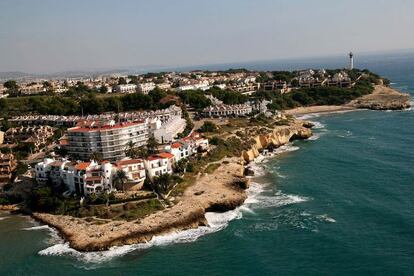Police and public team up to outwit Spain's vacation home scam artists
Fueled by the crisis, the number of fake apartment ads escalates in summer


It was a stroke of luck. Consumed by rage, Francisco managed to guess the email password of the man who had swindled him. "I paid him 100 euros as a deposit for an apartment by the coast, and as soon as he received it he vanished. I tried to enter his Gmail account. I didn't get the password right at first, so I tried the security questions. 'Who was your best childhood friend?' I typed in his name, and it worked!"
He discovered he wasn't the only victim of the scam; around 50 people had transferred between 100 and 375 euros for apartments in Conil, Cádiz and Ibiza. Francisco sent out warnings to the others, and then lodged a complaint with the Civil Guard.
In May last year, Francisco saw a promising advert on Niumba.com. "Two bed apartment in Conil. 650 euros for a fortnight. Ask for Daniel Vidal." The announcer left a phone number and email address. "It seemed cheap, so I wrote to confirm the price. He replied, saying the price was actually 850, not 650, but I could have it for 725. I still found it cheap, but he seemed trustworthy so I went along with it. I requested the flat for the first two weeks of August."
Fake ads can be found on the internet all year round, but numbers escalate during the summer months. "There aren't specific numbers as the ads are not regulated, but the increase is noticeable during those dates. Demand is high and hardly anyone wants to travel to their holiday destination beforehand to confirm the accommodation," says Nieves G. Sánchez, chief inspector of the Technological Investigation Brigade of the National Police. Prices much lower than the going rate are a good warning sign. "One has to be suspicious of bargains and ask a lot of questions. If there is any incoherence, it could be a scam."
One has to be suspicious of bargains and ask a lot of questions"
Thanks to Francisco, most of the others found out before they left for their holidays. Others such as María del Carmen were not so lucky. In a forum started by Francisco, she told of how she, her husband and four-month-old twins spent their first night on holiday in Ibiza in their car.
A year later, there is still no trace of 'Daniel Vidal' - he used the ID number of the real Vidal to open the bank accounts for his scam. "Just because he hasn't yet been caught doesn't mean it will never happen. We've solved some cases after a three-year search," says inspector Sánchez. "These investigations usually last a long time because tracking on the internet is complex. The majority of these people use fake identities, which further complicates the investigation."
The police recommend using trustworthy sites, although there is never a complete guarantee of safety. Almudena Ucha, manager of Rentalia.com, acknowledges that despite internal filters, some ads manage to slip through. "We have alert systems that question properties with unusually low prices or demanding high deposits. We do have to renew the parameters each year because scam artists are always inventing new methods."
Ignacio Asín, business manager of Niumba.com, points out that in the last two years scam ads have increased, although fewer people are falling for them. "The crisis has made apartments more popular, as they are cheaper than hotels... However, it is true that more users are now better informed and take more precautions."
When something happens, these websites wash their hands of you"
Non-existent apartments are not the only problems; according to the Federation of Independent Consumers (FUCI), these sorts of cases only make up about two percent of queries the organization receives. The rest - over 1,000 during the summer - concern the conditions of the accommodation: apartments with less space than advertised, further away from the beach than specified, that have defective appliances, and so on.
Gustavo Samayoa, president of FUCI, recommends demanding a refund, as well as compensation for any damages, making sure to have as much proof to hand as possible. Cristina has just made a complaint to FUCI.
Leaving her children with her mother, she went on holiday to find the apartment described as in the "second row from the beach" was at least five rows back.
Consumer associations advise filing complaints, but sometimes this is not an option. Manuel Ángel found himself stranded in New York, when his reservation was cancelled two days before the agreed date. He had made the reservation through Airbnb.com, and paid the full price of $1,124 (921 euros). "As [the website] permits cancellations up to two days before, I couldn't even make a claim." His transit stop in Washington had left him with no time to check his email.
Luckily, he received a refund, but was not reimbursed for extra expenses. Finding a cheap hotel at short notice was impossible, and "we ended up paying $1,800 [1,464 euros]... When something happens, these websites wash their hands of you. At the very least, they should enact penalties."
Tu suscripción se está usando en otro dispositivo
¿Quieres añadir otro usuario a tu suscripción?
Si continúas leyendo en este dispositivo, no se podrá leer en el otro.
FlechaTu suscripción se está usando en otro dispositivo y solo puedes acceder a EL PAÍS desde un dispositivo a la vez.
Si quieres compartir tu cuenta, cambia tu suscripción a la modalidad Premium, así podrás añadir otro usuario. Cada uno accederá con su propia cuenta de email, lo que os permitirá personalizar vuestra experiencia en EL PAÍS.
¿Tienes una suscripción de empresa? Accede aquí para contratar más cuentas.
En el caso de no saber quién está usando tu cuenta, te recomendamos cambiar tu contraseña aquí.
Si decides continuar compartiendo tu cuenta, este mensaje se mostrará en tu dispositivo y en el de la otra persona que está usando tu cuenta de forma indefinida, afectando a tu experiencia de lectura. Puedes consultar aquí los términos y condiciones de la suscripción digital.








































